Erstellt am: 23. 11. 2012 - 16:15 Uhr
Small Classrooms, Big Smiles
This is some welcome! On my bike, a bit saddle-sore after five long days of riding, I approach the Walyoba Primary School, 9km down a bumpy red-dirt track from near north-western Ugandan town of Masindi, and a team of schoolgirls, dressed in pale blue uniforms, have gathered to sing a greeting song.
A kneeling boy beats out a rythym on a drum and the girls sway left and then right clapping their hands as they sing the chorus "We welcome you, dear Misters".
Dieses Element ist nicht mehr verfügbar
Each girl takes a turn to step out in front of the group and sing a solo verse. Each time it`s a few lines lyrics about our bike ride from the south and how pleased they are that we are visiting. Then they step back into the swaying group, jumping to the left and right, for a further rendition of the chorus.
I`ve never seen anything like this. It must have taken days of planning and practice and it is deeply moving.
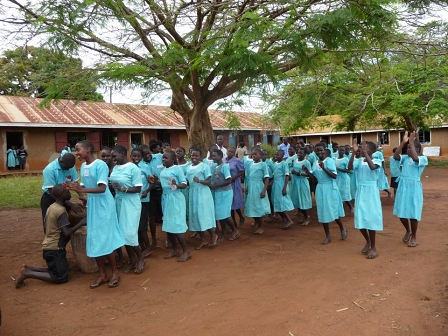
chris cummins
This is a good school. You can see that immediately. The classrooms are clean and decorated with posters and the teachers seem engaged and energetic. But the problems are painfully obvious.
There are 86 children in the first class we visit. With four or five squeezed onto each small table, they are literally rubbing shoulders with each other. All in all there are 800 pupils and just 15 teachers.
"All over Africa", says Alex of Link Community Development, "it`s a real challenge to have enough teachers to really enable effective learning."
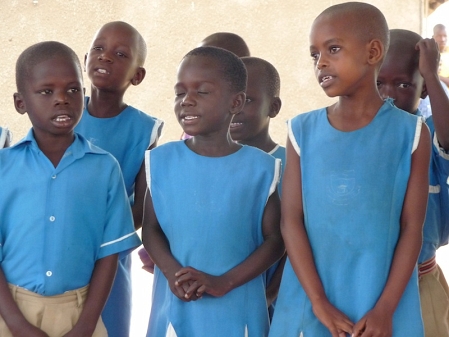
chris cummins
What you see is a lot of rote learning. (Auswendiglernen)
Peering through an open window, so as not to disturb the class, I watch a science class in progress. It`s surprisingly advanced subject for primary school:
"As I was saying, the cervix encloses the uterus", explains the teacher, pointing at a diagram he has drawn in chalk on the blackboard, "It encloses the what…?"
"THE UTERUS!", shout out the children in unison.
Rote Learning
Ugandan Diary
A bike tour through Africa (Chris Cummins)
Rote learning is anything but ideal, but here you can see how you can make the best out of a difficult situation.
"The challenge in the here and now," says Alex, "while we wait for all those projects to come into fruition that are trying to boost the number of teachers, is to try and make the most of the resources they have at hand."
Link`s job, he says, is to support e teachers to work as efficiently as they can and make sure that they have as much contact time as they can with the pupils.
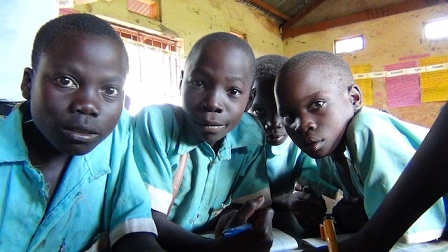
chris cummins
The teacher I am watching is a good example. A handsome, shaven-headed young man in a shirt and tie, he struts around making eyes contact and interjecting the occasional "Have you understood?" He has the aura of a showman. It`s a skill you must need.
When I come back later the pupils are discussing the technicalities of HIV infection, with the teacher warning of the added dangers posed by bleeding genital sores.
Blunt but Life-Saving
These are just primary school kids, I remind you, and this bluntness might seem shocking; a sort of theft of innocence. But those are secondary concerns. There is no excuse to be squeamish in a country where with a record of high HIV infection and where traditionally villagers become sexually active at an early age. These are potentially life-saving lessons. I am impressed.
One of my fellow cyclists; Jane Dickenson recently spent a summer working in a rural Ugandan school. "The classrooms were small and mostly had dirt floors. The children had no shoes but they had great big smiles," Jane remembers. She was impressed by the enthusiasm, but saddened by the challenges the children faced:
"They have to help their parents all the time to plant crops, to feed the chickens and to collect to goats. They have household chores all the time."
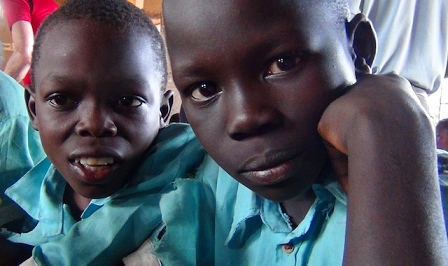
chris cummins
Girl Power
That`s why Alex was particularly impressed that the Walyoba school has a relatively low drop-out rate for girls:
"The old adage is that if you educate a girl you educate a family and it is really important", he tells me.
Some experts claim that providing girls with a decent education is the single most efficient investment you can make in development, but it is often the girls that are withdrawn first from the classrooms, often because they forced into early marriage or are obliged to look after siblings.
"It is really encouraging to see the progress this school is making on keeping girls through the later years. It shows the issues are being addressed and that the school is being proactive about keeping the girls". That means working together with the local communities to help them understand the value of education for boys and girls. It`s a focus of Link`s concept.
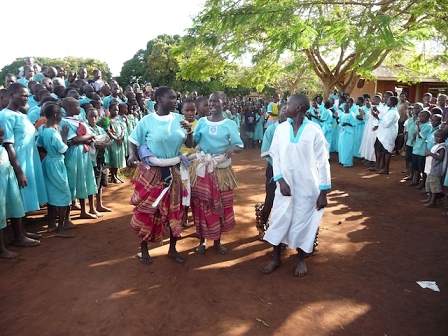
chris cummins
The Digital Gap
Headteacher Susan Babiiha proudly shows me the schools new piece of equipment. It`s a laptop powered by the solar system donated by Link to give the provide the school electricity. The teachers use it to communicate and to enhance their lessons with the latest information from websites. This one solitary computer might seem like trifling progress, indeed the sad truth is that rural Africa is falling ever further behind more digitally connected parts of the developing world.
But these things can make a difference, and villagers come to the school to use the computer and use the schools solar electricity to charge their mobile phones which have now become an essential part of commerce in Africa. Previously they`d have to travel to the nearest town and by making the schools a focal point of village life, the solar power has raised its prestige in the eyes of the community.
It`s humbling to see the enthusiasm of the children and their eagerness to learn. These kids don`t deserve to be pitied, they deserve to be believed in and supported.
Growing up, I had everything I needed provided for me, supportive parents, small classes, good books and the latest equipment, and yet spend much of the lesson staring out of the window. I wondered what each of these children could have done with the opportunities we are spoiled by in the West?
It is in essence why we are cycling through Uganda on this charity bike ride, raising a limited amount of money for Link Community Development and, perhaps more importantly, awareness of the problems.
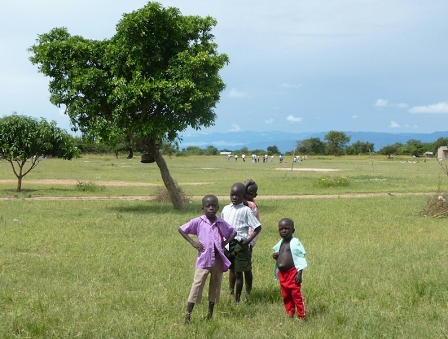
chris cummins
As Richard Human, a primary school teacher based in The Hague in the Netherlands puts it: "We just need to give everyone in the world a chance at doing the best they can do and children in Africa are born into such a disadvantage that they simply don`t have that chance."
You can only hope that one day they will.
Dieses Element ist nicht mehr verfügbar


